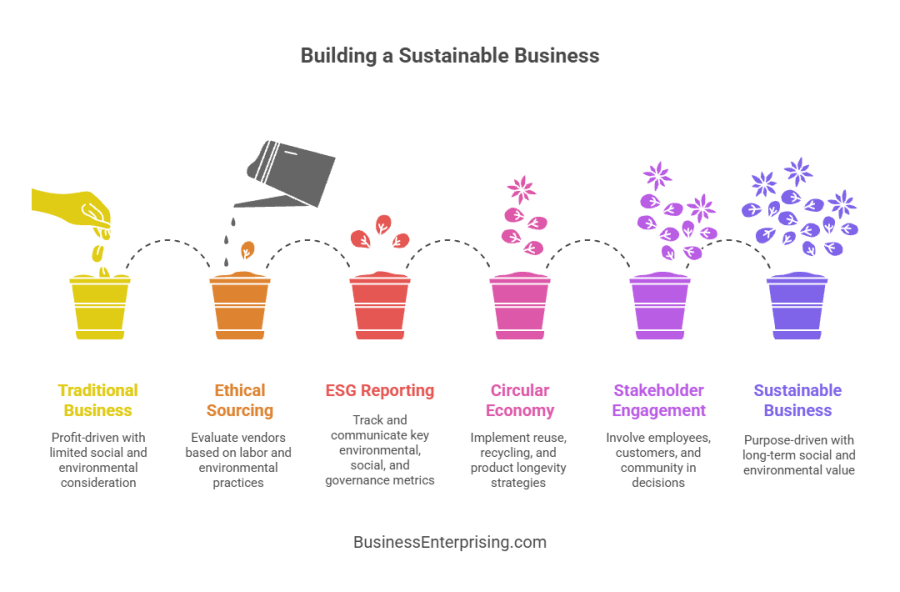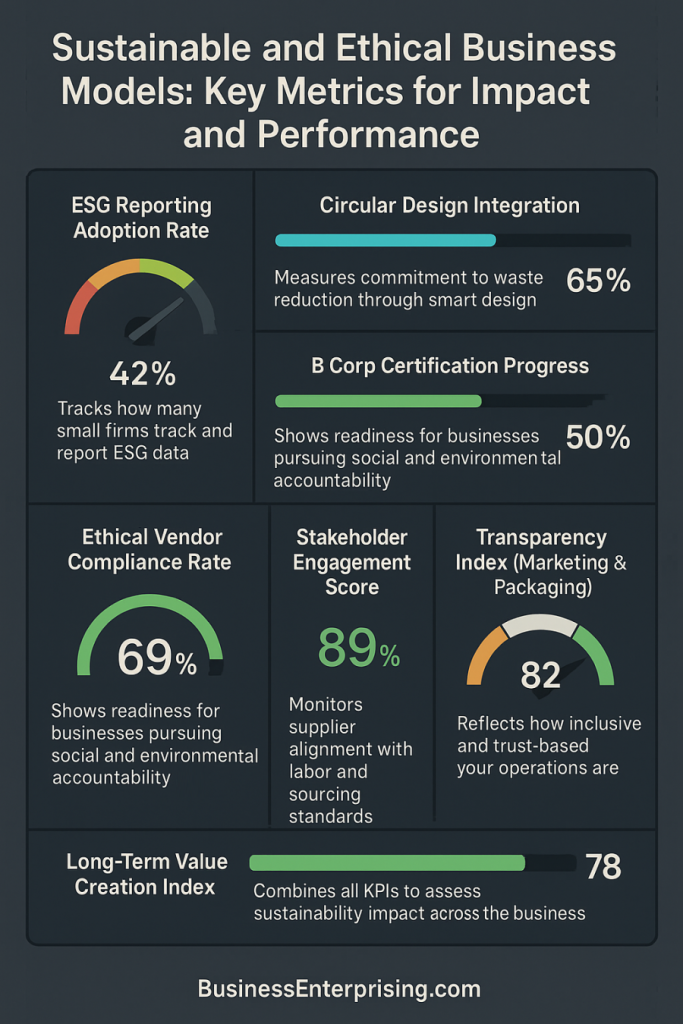 Sustainable and ethical business models are no longer optional. They are a practical response to changing customer expectations and shifting market conditions. Companies that act with responsibility build stronger reputations and long-term trust. Therefore, aligning your business with social and environmental priorities can benefit both purpose and profit.
Sustainable and ethical business models are no longer optional. They are a practical response to changing customer expectations and shifting market conditions. Companies that act with responsibility build stronger reputations and long-term trust. Therefore, aligning your business with social and environmental priorities can benefit both purpose and profit.
Additionally, responsible practices often lead to smarter operations. Reducing waste, improving sourcing, and listening to your team can lower costs and improve results. You do not need to overhaul your business overnight. Instead, take small steps that align with your goals and values.
You should also focus on transparency. People want to know how products are made, who is behind them, and what values guide decisions. Therefore, clear and consistent communication is part of building trust. Authentic messaging earns more support than big claims with little proof.
Long-term business success depends on more than financial metrics. It depends on the relationships you build with your employees, your customers, and your community. Additionally, these relationships deepen when your actions reflect your values. By leading with purpose, you create a business people want to support.
Integrating ESG Reporting and Compliance in Small Business Operations
Small businesses often assume ESG reporting is only for large corporations. However, even modest efforts can strengthen your business and brand. You do not need a full department or expensive tools to get started. Instead, focus on tracking a few key metrics tied to your operations.
Start by choosing what matters to your business. Environmental tracking might include energy use or waste reduction. Social reporting could highlight employee practices or local partnerships. Additionally, governance can reflect how decisions are made and who is involved. Therefore, you can begin with data you already collect.
You should also keep your reporting simple. A one-page summary or clear bullet list may be enough. Additionally, update it once or twice a year and include real examples. Customers and partners value clarity more than complexity.
ESG reporting builds trust over time. Investors and customers want to work with businesses that act responsibly. Therefore, showing your efforts, no matter how small, can help you stand out. Additionally, some contracts or funding opportunities now ask for ESG information. Being ready shows that you take your responsibilities seriously.
Sustainable and ethical business models often begin with small, consistent steps. You do not need to be perfect to make progress. What matters is that you are tracking, improving, and communicating. Over time, these actions support growth and keep your business accountable to more than profits.
Circular Economy Principles in Product-Based Business Models
Product-based businesses create a lot of waste when items are made, sold, and discarded quickly. However, you can shift this pattern. Circular economy principles focus on reuse, recycling, and product longevity. These ideas can reduce waste and build lasting value.
Start by rethinking product design. Choose materials that are easy to recycle or reuse. Additionally, design parts that can be repaired or upgraded instead of replaced. Therefore, your customers can keep products longer and reduce waste over time. This also builds loyalty and improves customer retention.
You should also consider offering take-back programs. This helps you recover used items, parts, or packaging. Additionally, you may find ways to refurbish or repurpose returned products. That can create new revenue streams and reduce your material costs.
Manufacturing smarter also supports circular goals. Use fewer resources and focus on durable, efficient production. Therefore, you waste less and build products with longer value. Additionally, being transparent about your process helps build trust.
Sustainable and ethical business models rely on long-term thinking. Circular strategies support profit without sacrificing responsibility. You don’t need to overhaul everything at once. Instead, start small and scale what works. Over time, this approach benefits your business, your customers, and the environment.
Getting Started with B Corp Certification and Social Impact Entrepreneurship
B Corp certification helps show that your business values more than profit. It reflects a commitment to people, the planet, and good governance. To qualify, you must meet standards in areas like worker treatment, environmental impact, and transparency. Therefore, your business must measure and improve how it affects others.
The certification process begins with an assessment. This helps you evaluate your operations across social and environmental categories. Additionally, you’ll need to meet a minimum score and update your company’s legal structure. These changes confirm that you prioritize impact alongside revenue.
You do not need to be perfect. However, you should show a clear intent to balance purpose and profit. Many small businesses already meet several of the standards. Therefore, becoming certified may require fewer changes than you expect. Additionally, the process can uncover ways to strengthen your current practices.
Social impact entrepreneurs often look for ways to build with intention. B Corp certification provides a framework for doing that. It helps connect you with like-minded peers and opens doors to conscious consumers. Therefore, the certification can also support marketing and brand trust.
Sustainable and ethical business models benefit from clear accountability. Certification is one way to show that your values guide your actions. You make decisions differently when you consider long-term impact. That shift can shape how your team works and how your customers respond.
Ethical Sourcing and Transparent Supply Chains
Ethical sourcing starts with knowing who you work with. You need to evaluate vendors based on more than cost and delivery speed. Ask direct questions about labor conditions, wages, and workplace policies. Additionally, request documentation that shows how they treat their workers and manage their operations.
You should also conduct site visits when possible. If that’s not an option, consider working with third-party auditors. These steps help you confirm that your partners meet your values. Therefore, you reduce the risk of working with suppliers who cut corners or hide poor practices.
Additionally, use your contracts to spell out expectations. Make fair labor standards part of your supplier agreements. That way, your values are reflected in your business relationships. When problems arise, act quickly and clearly. Vendors should know that you take these issues seriously.
Transparency matters to your customers. People want to know where their products come from and how they are made. Therefore, share your sourcing practices on your packaging or website. You don’t need long reports. Clear, honest statements go a long way.
Sustainable and ethical business models depend on strong supply chain decisions. You shape more than your products. You shape conditions across your industry. When you lead with fairness and transparency, you build trust that lasts beyond a single transaction.
Stakeholder Engagement and Long-Term Value Creation
Stakeholder engagement is more than a public relations move. It is a way to build smarter strategies that reflect shared interests. When you involve employees, customers, and communities in your decisions, you reduce blind spots and build deeper trust.
Additionally, employees often have ideas to improve processes or products. Listening to their input shows respect and strengthens loyalty. Therefore, make time for feedback sessions and follow-through. That small step helps you create better systems while keeping morale strong.
You should also engage your local community. Ask what matters to them and how your business can contribute. Additionally, support local causes or participate in community events. These actions help build relationships that last beyond individual sales.
Customers also have a role to play. Ask for their feedback and include it in product development or service updates. Therefore, your customers feel valued and more likely to stick with your brand. People support companies that listen and respond.
Sustainable and ethical business models rely on long-term thinking. Engagement builds trust, which builds loyalty. That loyalty makes your business more stable, even when conditions change. When people feel included, they invest more deeply in your success. Over time, that creates value far beyond revenue.
Sustainable Branding and Customer Communication
Branding around sustainability should match your actions. Many companies lose trust when their claims sound bigger than their impact. Therefore, speak clearly about what you’re doing and why. Keep your message simple, factual, and direct.
Additionally, your marketing should focus on real outcomes. Share what materials you use, how you source them, or what you’re reducing. You don’t need flashy slogans. Customers want honesty more than hype. Use plain language that matches your brand tone and values.
You should also look at your packaging. Choose materials that are recyclable or reusable when possible. Then explain your choices to your customers. Therefore, they know how to dispose of it properly. Clear instructions and honest explanations help avoid confusion.
Brand storytelling should reflect your company’s values and progress. Share both successes and areas for improvement. Additionally, let your customers see the people and processes behind your products. These small details build trust and strengthen your brand.
Sustainable and ethical business models depend on consistent, honest communication. Avoid buzzwords that mean nothing. Instead, focus on clarity and progress. Customers will notice the difference. Over time, you’ll build a brand that people trust and want to support.
Conclusion
Running a responsible business takes more than good intentions. It requires daily decisions that align with long-term impact and integrity. Therefore, your commitment must show in your operations, partnerships, and communication.
Additionally, no business can solve everything at once. Focus on what fits your mission and values. Then build from there. Small changes can lead to meaningful results when applied consistently. You should keep your team and customers informed as your efforts grow.
Sustainable and ethical business models are not a trend. They are a smarter way to build trust and long-term value. When people see consistency in what you say and do, they respond with loyalty. That support helps keep your business stable during shifts in the market.
Therefore, take time to review your practices and set clear goals. Share progress honestly and invite feedback from your community. Additionally, stay open to new ways of doing things that align with your purpose. Your choices today shape the reputation and resilience of your business tomorrow. Keep your focus on impact, not perfection. That mindset will guide your work in the right direction over time.



